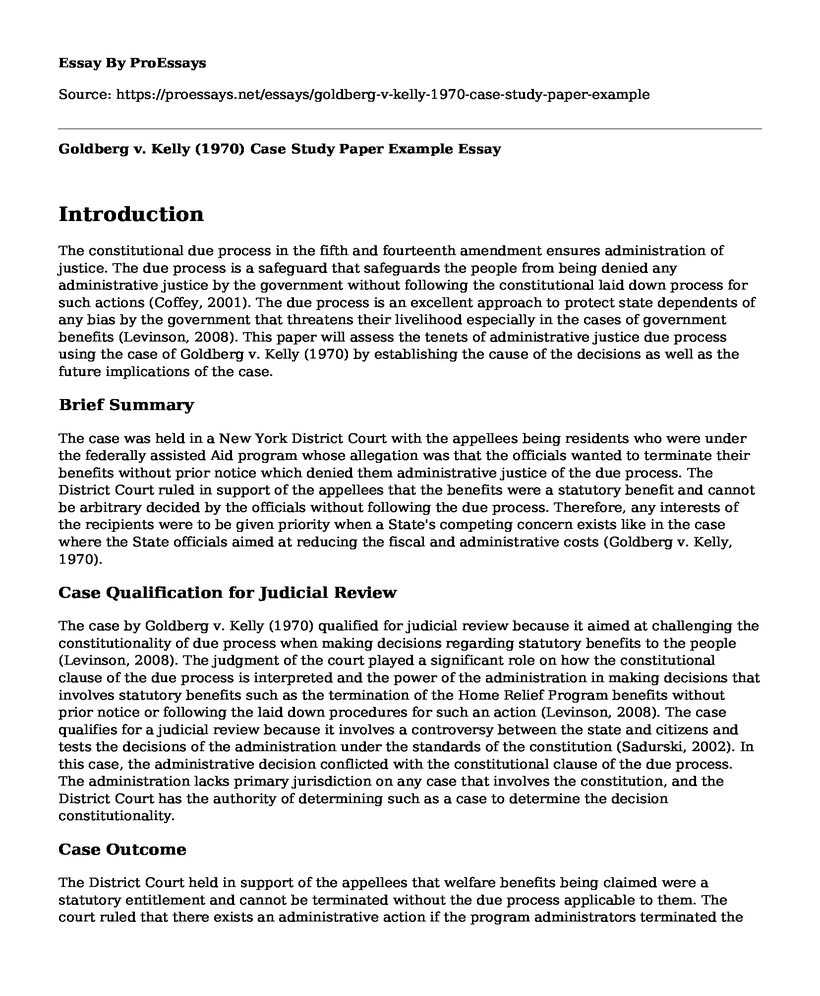Introduction
The constitutional due process in the fifth and fourteenth amendment ensures administration of justice. The due process is a safeguard that safeguards the people from being denied any administrative justice by the government without following the constitutional laid down process for such actions (Coffey, 2001). The due process is an excellent approach to protect state dependents of any bias by the government that threatens their livelihood especially in the cases of government benefits (Levinson, 2008). This paper will assess the tenets of administrative justice due process using the case of Goldberg v. Kelly (1970) by establishing the cause of the decisions as well as the future implications of the case.
Brief Summary
The case was held in a New York District Court with the appellees being residents who were under the federally assisted Aid program whose allegation was that the officials wanted to terminate their benefits without prior notice which denied them administrative justice of the due process. The District Court ruled in support of the appellees that the benefits were a statutory benefit and cannot be arbitrary decided by the officials without following the due process. Therefore, any interests of the recipients were to be given priority when a State's competing concern exists like in the case where the State officials aimed at reducing the fiscal and administrative costs (Goldberg v. Kelly, 1970).
Case Qualification for Judicial Review
The case by Goldberg v. Kelly (1970) qualified for judicial review because it aimed at challenging the constitutionality of due process when making decisions regarding statutory benefits to the people (Levinson, 2008). The judgment of the court played a significant role on how the constitutional clause of the due process is interpreted and the power of the administration in making decisions that involves statutory benefits such as the termination of the Home Relief Program benefits without prior notice or following the laid down procedures for such an action (Levinson, 2008). The case qualifies for a judicial review because it involves a controversy between the state and citizens and tests the decisions of the administration under the standards of the constitution (Sadurski, 2002). In this case, the administrative decision conflicted with the constitutional clause of the due process. The administration lacks primary jurisdiction on any case that involves the constitution, and the District Court has the authority of determining such as a case to determine the decision constitutionality.
Case Outcome
The District Court held in support of the appellees that welfare benefits being claimed were a statutory entitlement and cannot be terminated without the due process applicable to them. The court ruled that there exists an administrative action if the program administrators terminated the program without the due process because it was infringing on the rights of the beneficiary and the decision to terminate the benefits could be unfair procedurally (Goldberg v. Kelly, 1970). The District Court reduced future arbitrariness by ensuring due process in any future administrative decisions regarding the welfare benefits (Levinson, 2008). The court ruled that it is essential for a pre-termination hearing to be held to ensure that the welfare recipient is provided with the due process procedures of terminating their benefits (Goldberg v. Kelly, 1970). In such case, the decision maker of such a case of the procedural process should provide evidence relied on in supporting the decision and should maintain impartiality.
Conclusion
The Goldberg v. Kelly (1970) case is an excellent judicial review case that reduces the arbitrariness of the decisions made by the administration regarding the welfare benefits. The court held that any decision in regard to the termination of the statutory benefits should undergo the due process to ensure administrative action is observed. The court held that the New York decision to terminate the appellees benefits was unconstitutional because the due process was not followed.
References
Coffey, K. (2001). The due process right to seek asylum in the United States: The immigration dilemma and constitutional controversy. Immigr. & Nat'lity L. Rev., 22, 255. Retrieved from https://pdfs.semanticscholar.org/109e/ec8da276d707f917dcf31064dbe6c0255235.pdf
Goldberg v. Kelly, 397 U.S. 254, 90 S. Ct. 1011, 25 L. Ed. 2d 287 (1970).
Levinson, R. B. (2008). Reining in Abuses of Executive Power Through Substantive Due Process. Fla. L. Rev., 60, 519. Retrieved from https://scholarship.law.ufl.edu/cgi/viewcontent.cgi?article=1045&context=flr
Sadurski, W. (2002). Judicial review and the protection of constitutional rights. Oxford Journal of Legal Studies, 22(2), 275-299. Retrieved from ProQuest https://doi.org/10.1093/ojls/22.2.275
Cite this page
Goldberg v. Kelly (1970) Case Study Paper Example. (2022, Nov 07). Retrieved from https://proessays.net/essays/goldberg-v-kelly-1970-case-study-paper-example
If you are the original author of this essay and no longer wish to have it published on the ProEssays website, please click below to request its removal:
- Research Paper on Examination and Arrest of Illegal Immigrants
- Essay on 14th Amendment and Key Court Decisions From 1870-1930
- Essay Sample on Police Officers' Mental Health: Accessing Support in Emergencies
- No Crime: Ross Drives to Save Lives - Essay Sample
- Elderly Victims of Multi-Billion Dollar Scam Business - Essay Sample
- Paper Example on Capital Punishment Ethics: Does the US Stance Conflict?
- Free Paper Example on Protocol of Evidence Collection







